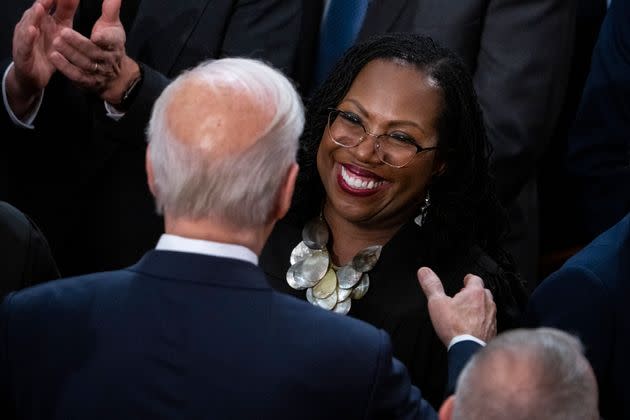WASHINGTON – The Senate confirmed President Joe Biden’s 200th judicial nominee on Wednesday, a significant milestone both in terms of the sheer number of lifetime federal judges he’s gotten confirmed and the astounding diversity he has infused into the nation’s courts.
Biden has surpassed the number of lifetime federal judges that Donald Trump had confirmed by this point in his presidency. Trump, who made judicial confirmations a major focus of his presidency, was at 196 by this point.
It is the diversity of Biden’s judges, though, that really stands out. He has put more women, people of color, LGBTQ+ people and professionally diverse people into lifetime federal judgeships than any of his predecessors, and in some cases, more than any of them combined.
Nearly two-thirds of Biden’s judges (127) are women, and nearly two-thirds (125) are people of color. About 40% of Biden’s judges (79) are women of color.
To put this into some context: A total of 3,254 white men have served on the Supreme Court, on appeals courts or district courts since the U.S. federal court system was created in 1789, according to the Federal Judicial Center.
In all that time, 416 have been white women and 565 have been people of color. Just 197 have been women of color.
The professional diversity of Biden’s judges is also off the charts. More than 40% of them (85) have backgrounds as public defenders or civil rights lawyers – a huge break from the centuries-long tradition of plucking people for federal judgeship from their jobs as prosecutors and corporate attorneys.
Biden has ushered in some historic firsts for the federal bench, too. He appointed the first openly LGBTQ+ woman to serve on a U.S. appeals court, Judge Beth Robinson of the 2nd Court of Appeals. He appointed the first Muslim American federal judge, Zahid Quraishi, to a U.S. district court. He has appointed four Native American people to lifetime federal judgeships, which is half of all the Native American federal judges appointed in U.S. history.
And, of course, Biden appointed Ketanji Brown Jackson to the U.S. Supreme Court, making her the first Black woman and former public defender to serve on the nation’s highest court.
“This is a major milestone,” Senate Majority Leader Chuck Schumer (D-N.Y.) celebrated ahead of the vote on Biden’s 200th nominee, Angela Martinez, a nominee to a U.S. district court in Arizona. “Simply put, our 200 judges compromise the most diverse slate of judicial nominations under any president in American history.”

Broken down, the president has confirmed a total of one Supreme Court justice, 42 appeals court judges, 155 district court judges, and two Court of International Trade judges. All are serving in lifetime appointments.
Biden “may well be able to match” Trump’s 177 confirmed U.S. district judges by the end of the year, speculated Russell Wheeler, a visiting fellow with the Brookings Institution’s governance studies program and president of the Governance Institute, a nonpartisan think tank.
“If he does, he would be second only to former President Jimmy Carter” in confirming that many U.S. district judges in a single term, said Wheeler.
But Biden is not likely to fill as many appeals court vacancies as Trump did, he said. By the end of Trump’s term, he had confirmed 54 appeals court judges. There simply aren’t enough vacancies for Biden, who has confirmed 42 appeals court judges, to fill to hit that number by the end of the year.
Ultimately, though, the president’s goal has been to appoint “a lot of judges who were not white males, and he’s exceeded that,” Wheeler added. “All things considered, I think he has a really impressive record.”


